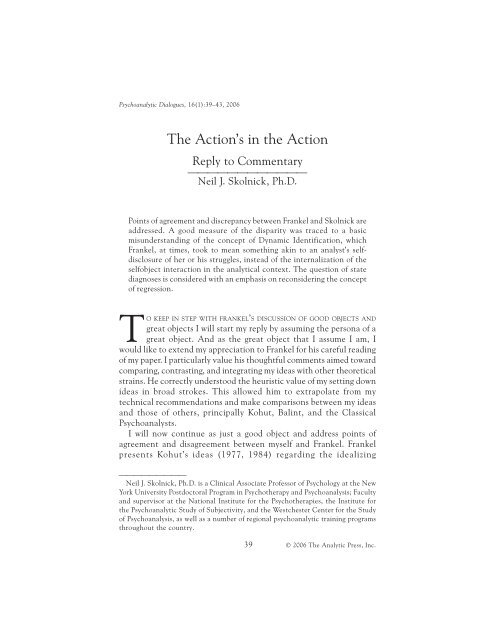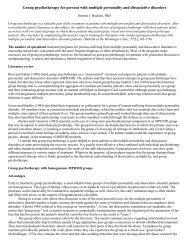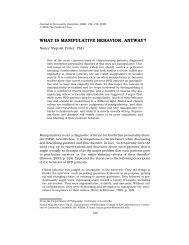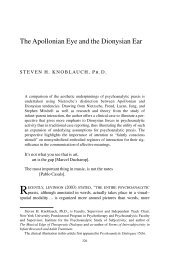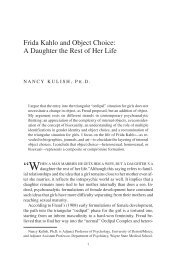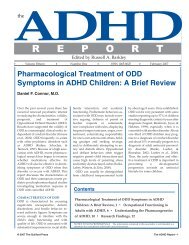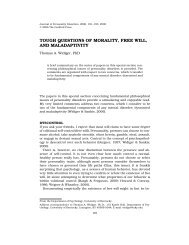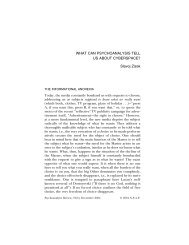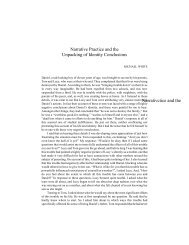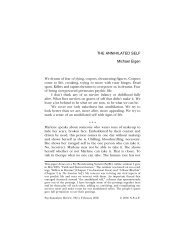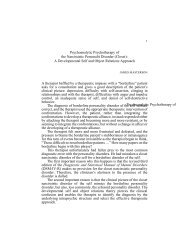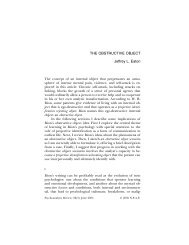What's a Good Object to Do? - PsyBC
What's a Good Object to Do? - PsyBC
What's a Good Object to Do? - PsyBC
You also want an ePaper? Increase the reach of your titles
YUMPU automatically turns print PDFs into web optimized ePapers that Google loves.
Psychoanalytic Dialogues, 16(1):39–43, 2006<br />
The Action’s in the Action<br />
Reply <strong>to</strong> Commentary<br />
⎯⎯⎯⎯⎯⎯⎯⎯⎯⎯⎯⎯<br />
Neil J. Skolnick, Ph.D.<br />
Points of agreement and discrepancy between Frankel and Skolnick are<br />
addressed. A good measure of the disparity was traced <strong>to</strong> a basic<br />
misunderstanding of the concept of Dynamic Identification, which<br />
Frankel, at times, <strong>to</strong>ok <strong>to</strong> mean something akin <strong>to</strong> an analyst’s selfdisclosure<br />
of her or his struggles, instead of the internalization of the<br />
selfobject interaction in the analytical context. The question of state<br />
diagnoses is considered with an emphasis on reconsidering the concept<br />
of regression.<br />
O KEEP IN STEP WITH FRANKEL’S DISCUSSION OF GOOD OBJECTS AND<br />
great objects I will start my reply by assuming the persona of a<br />
Tgreat object. And as the great object that I assume I am, I<br />
would like <strong>to</strong> extend my appreciation <strong>to</strong> Frankel for his careful reading<br />
of my paper. I particularly value his thoughtful comments aimed <strong>to</strong>ward<br />
comparing, contrasting, and integrating my ideas with other theoretical<br />
strains. He correctly unders<strong>to</strong>od the heuristic value of my setting down<br />
ideas in broad strokes. This allowed him <strong>to</strong> extrapolate from my<br />
technical recommendations and make comparisons between my ideas<br />
and those of others, principally Kohut, Balint, and the Classical<br />
Psychoanalysts.<br />
I will now continue as just a good object and address points of<br />
agreement and disagreement between myself and Frankel. Frankel<br />
presents Kohut’s ideas (1977, 1984) regarding the idealizing<br />
⎯⎯⎯⎯⎯⎯⎯⎯⎯<br />
Neil J. Skolnick, Ph.D. is a Clinical Associate Professor of Psychology at the New<br />
York University Postdoc<strong>to</strong>ral Program in Psychotherapy and Psychoanalysis; Faculty<br />
and supervisor at the National Institute for the Psychotherapies, the Institute for<br />
the Psychoanalytic Study of Subjectivity, and the Westchester Center for the Study<br />
of Psychoanalysis, as well as a number of regional psychoanalytic training programs<br />
throughout the country.<br />
39 © 2006 The Analytic Press, Inc.


